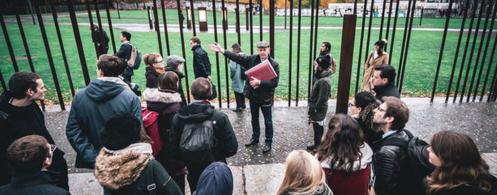
Von Ana Vasconcelos Martins und Sophie L. Vériter Forschungsassistenten, Europas Geschichten, Dahrendorf Programm, Zentrum für Europäische Studien, Universität von Oxford
Erzählungen, so schwer fassbar sie auch sein mögen, sind mächtige Kräfte der Geschichte, die die Ereignisse ebenso formen wie die Ereignisse sie formen. In einer Zeit, in der Europa vor vielen Herausforderungen steht - wirtschaftlichen, sozialen, ökologischen, politischen, ja sogar existenziellen und grundlegenden - werden die Geschichten, die Europa jetzt erzählt, bestimmen, was es in zehn Jahren und darüber hinaus sein wird. Daher ist es wichtig, die wichtigsten Erzählungen zu verstehen, die die Zukunft Europas prägen.
Auf seiner Konferenz zum 10. Jahrestag im Mai 2019 hat das Dahrendorf-Programm zum Studium der Freiheit offiziell das Projekt Europe's Stories gestartet, das von der Stiftung Mercator, der ZEIT-Stiftung und der Friedrich-Naumann-Stiftung finanziert wird. Das Projekt zielt darauf ab, die Geschichten zu erfassen, die Europa erzählt und erzählen sollte, sowie das, was die Europäer von der EU für die Zukunft erwarten.
Wie Professor Timothy Garton Ash, der Direktor von Europe's Stories, seinerzeit feststellte, gibt es potenziell so viele europäische Geschichten wie Europäer. Doch unabhängig davon, wie viele einzigartige Momente die Erzählung eines jeden Einzelnen prägen, gibt es vergangene Momente, gegenwärtige Sorgen und Hoffnungen für die Zukunft Europas, die die Erfahrungen der Europäer auf dem ganzen Kontinent durchziehen.
Research & events
Our team of more than 20 researchers from across Europe has set out to pin down the defining moments and aims that constitute Europe’s stories by combining the following research methods:
- Qualitative interviews with, and self-interviews by, people from different generations, places and social backgrounds, as well as experts from various subject areas;
- Opinion polling on EU policy preferences in partnership with the eupinions project of the Bertelsmann Foundation;
- Secondary research: data gathered from other normative, descriptive and analytical projects as well as interactive initiatives such as websites, podcasts and movements relating to the Europe’s Stories’ topic areas.
Since the 10th Anniversary Dahrendorf Conference, during which the project’s research focus was debated among specialists from fields as different as Politics and Theatre, our team has also organised a conference with ‘post-89ers’ (those born roughly between 1980 and 2000) in partnership with the Mercator Foundation in Berlin, where we carried out deliberative polling on Europe’s Stories core questions. We also conducted two workshops with high school students in Germany, where generational attitudes regarding the future of Europe were discussed. These events provided insights and feedback that proved crucial to the design of our ongoing research.
Key preliminary findings
Our interviewees answer a set of six questions about the moments they consider most significant in their experience of Europe. Based on the first 117 of these ongoing interviews, all of which can be viewed on the Europe’s Stories website, personal experiences such as studying and travelling abroad tend to be more formative than particular historic events. Correspondingly, freedom of movement leads as the single most important thing that the majority of interviewees say Europe has done for them personally. Most interviewees, in the UK and in other European countries, consider Brexit the worst moment in recent European history. Many, especially Eastern Europeans, name the Eastern Enlargement of 2004 as their best European moment.
Addressing climate change is the most popular answer to the interviews’ final question about the one thing our respondents would like the EU to have achieved by 2030. This finding partly informed the questions we put to Europeans in our first specially commissioned opinion poll about EU policy preferences. Aside from climate change policy, we also asked people’s opinions on jobs and social security. From that survey of more than 12,000 respondents between the ages of 16 and 69 in all 27 EU member states and the UK, two of our most remarkable findings reported were: (a) ‘71% of Europeans are in favour of a universal basic income (UBI)’; and (b) ‘53% of young Europeans think authoritarian regimes are better equipped to address the climate crisis’. This poll was conducted by our partner eupinions between 5 and 25 March 2020, thus likely reflecting the impact of the pandemic on our respondents’ concerns.
